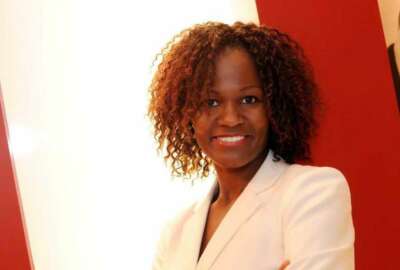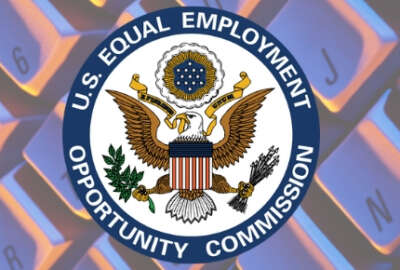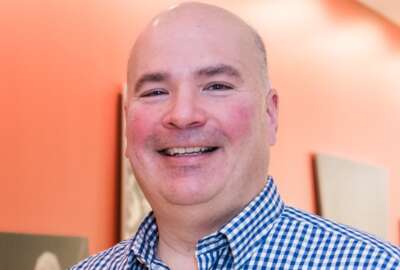
Next EEOC conference tackles the latest developments in unlawful discrimination
Each year the Equal Employment Opportunity Commission hosts a training conference for HR and EEO practitioners in both government and industry.
Best listening experience is on Chrome, Firefox or Safari. Subscribe to Federal Drive’s daily audio interviews on Apple Podcasts or PodcastOne.
Each year the Equal Employment Opportunity Commission hosts a training conference for HR and EEO practitioners in both government and industry. The topic: Conflicts in employment laws. With what’s on the top of the agenda and the ongoing efforts to stop unlawful discrimination, Federal Drive with Tom Temin turned to the EEOC’s Director of Federal Sector Programs, Dexter Brooks.
Interview transcript:
Tom Temin: Mr. Brooks, good to have you on.
Dexter Brooks: Good to be here, Tom, always a pleasure.
Tom Temin: And this idea of preventing workplace discrimination in both the federal workplace and I guess every workplace, including the industrial sector, is kind of a moving target. The laws change and the issues that come up change, and given the kinds of national discussion the country has been having in the past year or so, what are you seeing as the big issues for EEO practitioners, mainly in the federal government, but nationwide?
Dexter Brooks: I think your point is well placed, that it’s ever moving. So we constantly are working with folks that work in this space to understand how to look at issues of inclusion, because even though they may change, the way that you can address them can be a tool set that we want folks to have embedded within their organizations. So right now we’re looking at, of course, disability issues around COVID, and the pandemic. Return to work and those issues that are coming up with the vaccine. We of course, have this moment in time, which is also COVID related with Asian-American backlash, and being targets of harassment and discrimination. We have the president’s broad equity-based agenda that he’s presented. So there’s a rich context of things that are happening in EEO and diversity world, that this conference will help highlight some of those things that folks really need to address moving their organizations forward.
Tom Temin: And I want to delve into the COVID for just a moment, because I guess there is evidence that people may have long-term issues that were severely affected by the COVID-19 virus. And so I imagine that’s going to come up in the workplace in terms of accommodation maybe, and disability also. Is that what you’re seeing from the EEOC standpoint?
Dexter Brooks: Yes, there’s so many different output because of COVID that no one’s really prepared for a pandemic, even though we had pandemic guidance already in place. But the nuances of it – when can folks return to work? What’s effective accommodations to allow some workplace flexibilities that don’t compromise the organization’s mission, and its efforts to do whatever is in business to do, but also allows the employees to be safe and to make a meaningful wage. And so there are so many different things that are happening now, the impact of COVID, on women, which has been shown to be more drastic than on men. Like you said, we’re still trying to see what are the long term effects of the virus? And how does that play out in a person’s ability to work. So there’s so many moving targets as you started off the program with it, you know, we’re trying to keep up trying to give employers instructions, how they can operate and deal with this ever-changing environment.
Tom Temin: So it wouldn’t be too far fetched to say that as a management person, one should maybe include the EEO person and the HR people, but especially the EEO person, when formulating plans to get people back into the office.
Dexter Brooks: Without question, one of the things that we really stress to management teams, leaders of all organizations is to make informed decisions, you need folks who have specialties in a variety of things. So you have your finance folks, you have your infrastructure folks, but you also need the folks that help you manage your workforce. Because your key resource in any organization is the people and how you position them and allow them to have maximum success for your organization is imperative. So you definitely need that voice as a part of the organization and decision making.
Tom Temin: We’re speaking with Dexter Brooks, he’s director of federal sector programs and the Office of Federal operations at the Equal Employment Opportunity Commission. And this issue that you also mentioned – equity, as part of inclusion that many companies, many federal agencies, and as you pointed out, the administration is using. And if you would, for me from the EEO standpoint, the idea of equity, that word has replaced equality. And maybe you could explain the difference to people that are EEO practitioners or may come before one?
Dexter Brooks: These are words that do need definition, I think in some of the earlier, at least the earliest executive orders that President Biden signed had a definition of equity. From our perspective, same kind of similar concept, I think someone would say, equality means that everyone receives the exact same thing, and equity would be where you make sure everyone receives what they need to succeed. So everyone doesn’t have to [receive] everything the exact same. So like an accommodation, so if someone needs to use a different software package, you want to make sure that person has that software pack versus what everyone else receives, which may not be effective for them. So the concept of equity really tries to look at what individuals need to succeed, whatever activity they’re involved with. From our space, that’s employment.
Tom Temin: So that gets you past just the numbers game of this percentage of this color or race or that percentage of women and that kind of thing, but to really get them actually totally inculcated along with everybody else.
Dexter Brooks: Exactly.
Tom Temin: And tell us about the conference coming up, then, because this is the 24th year. And this is mainly for federal practitioners or private sector or both?
Dexter Brooks: It’s for everyone. So if you’re in private sector, you’re in academia, you’re in federal sector, we try to put together a robust agenda that will meet all needs. We have over three days, 36 workshops, to touch on all the topics that we’ve addressed, whether it be looking at equity, diversity, COVID-related issues, harassment prevention. We have novel sessions that we talk about what’s the economics of discrimination? What does it cost us in society where we have exclusion and things of that nature? So the conference is, like you said, is in its 24th year. This is the second year we’re virtual because of the pandemic, we’re on a virtual platform that allows us some new ways of delivering material. One of the great things that the virtual platform provides us is the ability to record and have those sessions that we traditionally were having in person conference available throughout the conference. So like if you’d normally go to an in person conference, you have four choices of workshops, and you only can choose one, but you may be interested in others, the way the virtual world works, we can record all of them, and you can go to your session live and see the other three recorded later in the day, or we allow the participants at least a month access to review recordings after the conference. So it gives them opportunity to participate even more than they would in a live in-person conference.
Tom Temin: And of course last year, at this time, everything had to be virtual. Now we’re kind of at a gray area where some things are beginning to poke at having people in person and still semi virtual. Do you see this ever going in person again? Or given the numbers that people have been able to garner online? Will you just keep it this way forever?
Dexter Brooks: That is still a question to be decided. I think we’re weighing the pros and cons of going back in person, which I think we probably will, but also ensuring that we maintain our virtual presence because like you said, the numbers that we get in the ability to reach folks that can’t afford to travel to a specific location or that their schedules don’t allow where they can review something on demand. So I think in the future, the virtual component of this conference will continue even if we go back to him in-person delivery of the conference.
Tom Temin: And that conference is taking place in June. We’ll have a link to it. Dexter Brooks is director of Federal Sector Programs and the Office of Federal Operations at the EEOC. Thanks so much for joining me.
Dexter Brooks: Tom, it’s always a pleasure. Thanks for sharing the message with our stakeholders.
Tom Temin: We’ll post this interview at FederalNewsNetwork.com/Federal Drive. Subscribe to the Federal Drive at Apple Podcasts or wherever you get your shows.
Copyright © 2025 Federal News Network. All rights reserved. This website is not intended for users located within the European Economic Area.
Tom Temin is host of the Federal Drive and has been providing insight on federal technology and management issues for more than 30 years.
Follow @tteminWFED





